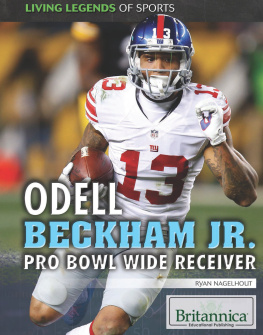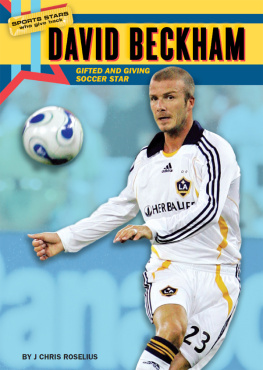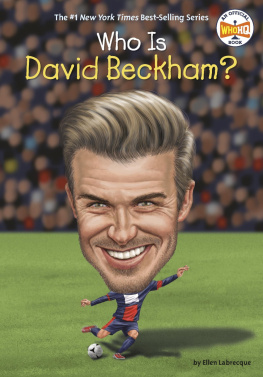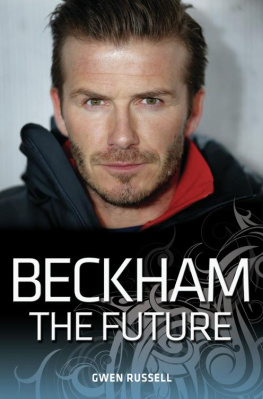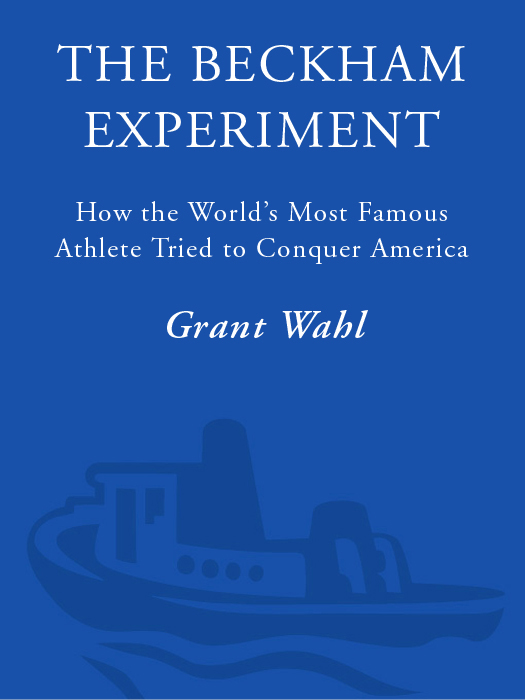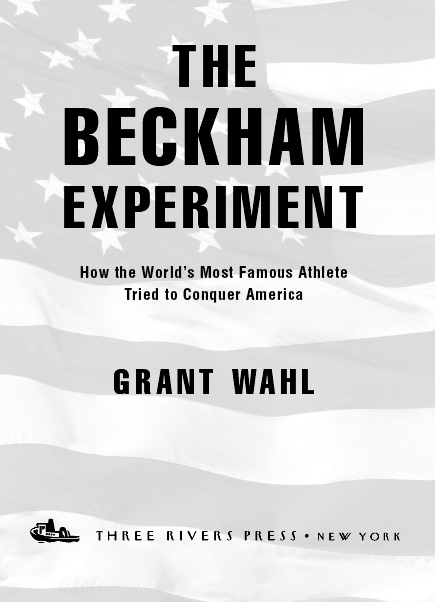More Advance Praise for
THE BECKHAM EXPERIMENT
Its not behind-the-scenes access; its what you do with it. Grant Wahl knows his soccer, but mostly he knows a great story, at turns funny, sad, bizarre, and, yeah, occasionally a little juicy. If the best thing that came out of Beckham coming to America was this book, Id say it was a fair trade.
Will Leitch, author of God Save the Fan, contributing editor
for New York magazine, founder of Deadspin.com
Grant Wahl crafts a bounty of insider details and vivid character portraits to reveal the Beckham beneath the stagecraft and photo shoots. With great care, Wahl unveils a book ribboned by humorous accounts and moments of disillusionment, conflict, and drama, all surfacing when a humble MLS team finds itself taken over by Brand Beckham.
Selena Roberts, author of A-Rod
Grant Wahls account of the Beckham Experimentas well written as it is well reportedis an unqualified triumph. The Becks cultists will devour this, but so will those of us who simply like a damn good sports book.
L. Jon Wertheim, author of Strokes of Genius
Forget the underwear ads. Forget the movie. Want to know about the worlds most famous athlete and his impact on the world around him? Let Grant Wahl show you. Having barreled through the crack created by Captain Galaxys fish-out-of-water foray into America, Wahl reveals the strange welter of celebrity, sport, and mind-boggling obliviousness lying at its core. Armed with unparalleled access and tapping into the lacerating candor of those closest to the now-sputtering experiment, Wahl raises the bar on what to expect from a sports book. For anyone looking to expose the backstage workings of an American team and leaguenot to mention the cross-pollination of pop culture and sportsheres the new model: Write it like Wahl.
S. L. Price, author of Heart of the Game
17.
INTRODUCTION
THE BECKHAM EXPERIMENT
I n the summer of 2005, on a gorgeous morning in Marina del Rey, California, I bumped into an old acquaintance in the lobby of the Ritz-Carlton Hotel. In almost any other city in any other country, David Beckham would never have dared to tempt the paparazzi and swarming fans who track his every move. But here he was, hands in his pockets, comfortable, unbothered, just like any other bloke. It had been two years since our last meeting, a long and candid interview in New York City just before Beckhams move from Manchester United to Real Madridthe worlds biggest sports story of 2003. Now Real was in town for a preseason exhibition game against the Los Angeles Galaxy. Beckham and I said hello, caught up with each other, and (not for the first time) talked about his desire to play in America someday. He sounded earnest, but I figured that day was six or seven years away, when Beckham would be a spent force on the European scene.
Less than two years later, in May 2007, I found myself sitting across from Beckham in Madrid, just the two of us in a quiet makeup room for an hour. On a rainy day in the Spanish capital, he had arrived at the studio by himself, an entourage of one in an outfit bearing no logos. In his plain white V-neck T-shirt, ordinary blue jeans, and five-year-old brown work boots, he could have passed for a cattle hand in Kalispell. In his only interview with a U.S. sports journalist before he joined the Galaxy that July, Beckham explained why he had shocked the sports world four months earlier by signing at age thirty-one with a team in Major League Soccer, the eleven-year-old U.S. soccer circuit.
When Id spoken to you before, the U.S. always interested me on the soccer side more than anything, and at some point I always thought I would play in America, Beckham told me. But it came earlier maybe than I actually expected. A decision had to be made, and Ive always gone on a sort of gut instinct: Is it the right time? I believe its the right time. Ive spent four good years in Madrid playing with some of the best players in the world. Ive played in Europe for almost fifteen years at the highest level and won just about everything I possibly could. And then this was offered to me: Do I want to be an ambassador for the MLS?
Its not often that the worlds most famous athlete decides to leave the comfort and security of the environment in which he became a global icon and embark on a new and risky adventure in one of the few countries where he isnt a household name. Yet that is exactly what David Beckham was doing by leaving Europe to join the Galaxy on a five-year contract. He certainly didnt need the money after earning an estimated $150 million in the five years before his move to America. Nor did he need the fame after marrying Victoria Adams (aka Posh Spice of the British pop group the Spice Girls), winning seven league championships in England and Spain, serving as captain of England for five years, and establishing himself as an undeniable global marketing force from Europe to Asia. Nor did Beckham need to drop down to MLSs lower standard after proving with Real Madrid and England in the first half of 2007 that he could still thrive at the sports highest levels.
But to hear Beckham make the case, the decision to relocate his wife and three young sons to Los Angeles was an easy one. It didnt take me long to think about, to be honest, he said. Moving the family to the U.S. was probably one of the easier decisions, just because the lifestyle was going to suit the children and me and Victoria. And on the playing side, I had to look at everything. Ive always known the level is not as high as it is everywhere else in the world. But if I can make a difference and make people more aware and make kids realize that you can actually go into higher levels and make a great living playing soccer, thats what Im going over there to do. Im not silly enough to think Im going to change the whole culture, because its not going to happen. But I do have a belief that it can go to a different level, and Id love to be part of that.
Beckham knew he was bringing a raft of expectations with him, many of which he was already trying to dispel. He was not coming to become a Hollywood actor, not then, not ever. (Acting is never something Ive been interested in, he said.) He was not coming to score three goals a game. (Thats one thing Im worried about, because people probably do think theyre going to see me turn out and well win our first game ten-nil.) And he was not coming simply to be a marketing tool (though his signature cologne, Instinct, was available in many fine drugstores). Im moving to America because of the soccer, Beckham insisted. I didnt want to make it into a big sort of hoo-ha where it was more about other things than the soccer. Its not a big brand thing.
Yet the task facing Beckhamto make soccer matter on a regular basis in the U.S.would be enormous. The greatest player of all time, Pel, couldnt turn soccer into the daily religion that it is nearly everywhere else in the world when he played with the New York Cosmos in the late 1970s. (His league, the NASL, folded a few years after he retired.) Nor did the U.S.s hosting of the 1994 World Cup. Since its inception in 1996, Major League Soccer had gained stability and produced competent young American players, but it was still losing money and had yet to advance beyond niche status. There were plenty of Americans who considered themselves occasional soccer watchersthe U.S. television audience for the 2006 World Cup final (16.9 million) beat out the average audiences for that years NBA Finals (12.9 million) and World Series (15.8 million)but they followed only the sports biggest events, and the few hard-core American soccer fans preferred the European Champions League and the superior leagues in England, Spain, and Mexico to MLS.



